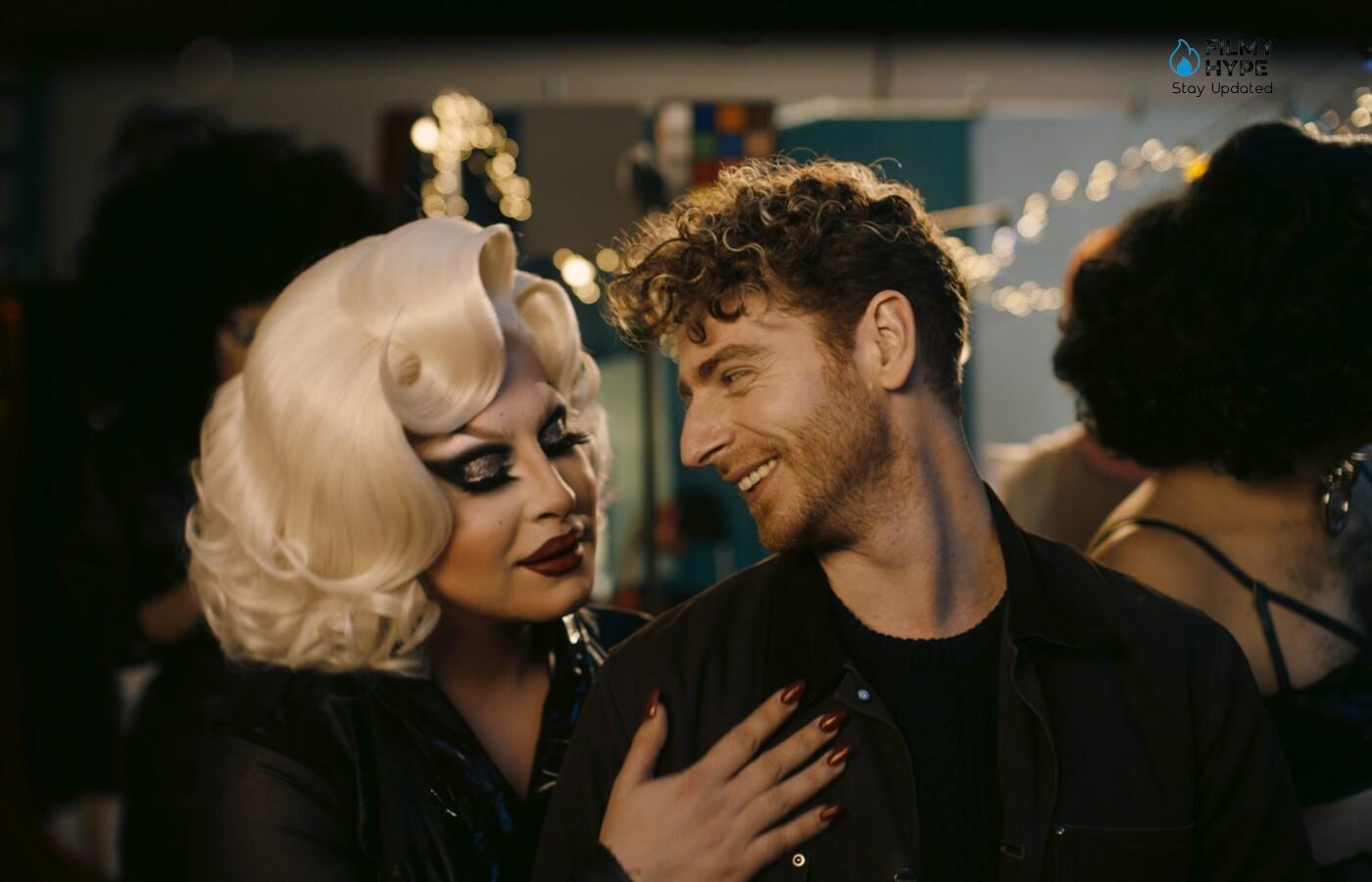Three Nights a Week Review: Florent Gouëlou Takes Us Into The World Of Drag Queens | Trois nuits par semaine
Stars: Pablo Pauly, Romain Eck, Hafsia Herzi
Director: Florent Gouëlou
Filmyhype.com Ratings: 3.5/5 (three and a half stars)
After getting to know the art of drag queens during the making of the short A Man My Son (2017), Florent Gouëlou returns to explore that world with Three Nights a Week (Trois nuits par semaine), and his first feature film. Among the participants in the International Critics’ Week, an independent program in the frame of the 79th Venice Biennale International Film Festival, the film features a screenplay signed by the French director himself, himself a drag queen in real life.

Directed by Florent Gouelou, Three Nights a Week opens the selection of the 37th edition of the SIC with a handful of glitter and a lot of heart. The film is a tender, unconventional love story that goes hand in hand with the search for one’s own identity that is not necessarily defined by a label. What Baptiste and Cookie / Quentin seem to teach us, played by the splendid Pablo Pauly and Romain Eck, is that the definition of our sexual orientation does not always exhaust who we are as human beings and that much the difference is made not by biological sex or preference, but by the person we meet. Baptiste learns this at his expense, questioning a stable and canonical life, albeit apparently “sitting” on tired dynamics.
Three Nights a Week Review: The Story
The protagonist of Three Nights a Week is Baptiste (Pablo Pauly), 29 years old who dreams of making it as a photographer. Engaged with Samia (Hafsia Herzi), a graduate student in medicine, and manager at an electronics store, the young man has a stable private life which, however, does not make him happy, unable to understand what he wants from the future. To upset the boy’s existence is the meeting with Cookie Kunty (Romain Eck), a drag queen who performs in Parisian nightclubs, from which Baptiste is thunderstruck to the point of deciding to create a photographic project dedicated to her and her companions, revealing the background of their world as they prepare for a competition that would change their lives. Baptiste, however, soon realizes that he is increasingly attracted to Quentin, the boy behind the charming drag queen, thus questioning what he believed he knew about himself up to that moment.
Three Nights a Week Review and Analysis
An active member of the drag scene for years now, Gouëlou relies on all his personal experience, although not necessarily autobiographical, to give the most human and faithful portrait possible of the world he is about to explore. What makes the young filmmaker’s operation particularly successful is the fact that he is not interested in providing a sweetened account of what it means to be a drag queen. The director’s aim to go beyond the glitz and glitter where the eye of many media often stops, although these elements are well present revealing themselves to be an integral part of the formal rendering of the title. A mission was carried out mainly through a study on the bodies of Cookie and the other characters. Like Baptiste’s camera, often showing them through her lens, Gouëlou is magnetically attracted to the figures of the drag queen’s protagonists, pinpointing details that are not reduced to mere voyeurism, but rather evoke the fascination that arouses Baptiste in the first person.
Bodies are not only seductive but also tired, which the director goes to “peel” (like a banana, the young photographer reflects in the film), showing the sweat and pain after the exciting performances. Like Baptiste in his project, the whole Three Nights a Week plays on the idea of contrast. Gouëlou stages incredible numbers in which the drag queen group is the protagonist. Between palette, neon lights and a soundtrack that ranges from the 70s disco to the 2000s, the director takes the viewer by the hand and takes him to the dance floor building engaging sequences to the rhythm of music, not sparing himself in camera movements that exude the energy from which, slowly, Baptiste also lets himself be overwhelmed.
However, a montage cut is enough to take us into the dressing room where Cookie, layer by layer, removes wig, makeup and false nails to reveal a tried and aching Quentin. The title thus brings to light the grueling work (from the study of the choreographies to the creation of the clothes) behind the sumptuous performances and does not hesitate to show the social judgment that targets drag queens, photographed in an almost always nocturnal Paris that sees them often victims of verbal and physical assaults. Three Nights a Week, however, is above all a love story, which Gouëlou tells with extreme delicacy. Pauly and Eck are a perfect couple of leading actors in this sense, giving face to two halves, one complementary to the other. The images light up with an emotional charge when Baptiste’s embarrassed smile and shy eyes meet Cookie/Quentin’s strong personality and penetrating gaze.
However, this subdivision of characters becomes less and less clear as the story progresses and the director is skilled in making how each brings to light hidden aspects of the partner, making the photographer more and more willing to bet on their relationship, whereas Quentin he reveals all his insecurities about life. In writing, the film follows a rather conventional path in the romantic field, moving between predictable ups and downs in the relationship, sometimes opting for hasty resolutions, from the love at first sight that drives the story to the resolution of some crises between the protagonists. Nevertheless, the evolution of their sentiment convinces not only by the interpretations of Pauly and Eck but also by the author’s choice to ensure that the obstacles to their relationship are not mainly constituted by the differences between the two parties or by the difficulty in accepting the other.
The enemy to fight in the film is first and foremost the unsolved problems that the protagonists have with themselves, so they need to deal with what they don’t accept about themselves before they can think about cultivating love. This approach allows the title to reflect on issues such as identity and fear of the future, which help lift the tale from the frequent platitudes of the romantic genre. Crowning the convincing result of this debut feature is a cast entirely in part, from the combative Bobel / Jerrie FK (Harald Marlot) to the good-natured Uncle Jean (Jean-Marie Gouëlou, father of the director). Above all, having entrusted most of the roles to real drag queens, in addition to constituting an ethical imperative for the author of the film, amplifies the great sense of authenticity that is imbued with Three Nights a Week, which also in its spaces opens the doors to us. Doors to real and recognizable places in the French capital, starting with the Espace Beaurepaire, an art gallery where at the beginning of the film we see Baptiste setting up his own exhibition.
Three Nights a Week Review: The Last Words
Gouëlou thus signs works with a captivating shape, nervous in capturing the total abandonment of the characters in the electric lights of the nightclubs and full of warmth in the moments in which they find in love and friendship a safe refuge from life. A classic love story enlivened by the eclecticism of drag art, a starting point to reflect on the eternal search for one’s own identity and on the centrality of thody as an instrument of liberation from the labels, those that are attached to us as well as those that we impose on ourselves.






